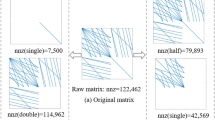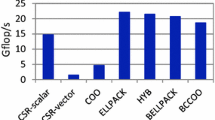Abstract
Double-double and Quad-double arithmetics are effective tools to reduce the round-off errors in floating-point arithmetic. However, the dense data structure for high-precision numbers in MuPAT/Scilab requires large amounts of memory and a great deal of the computation time. We implemented sparse data types ddsp and qdsp for double-double and quad-double numbers. We showed that sparse data structure for high-precision arithmetic is practically useful for solving a system of ill-conditioned linear equation to improve the convergence and obtain the accurate result in smaller computation time.
Tsubasa Saito and Satoko Kikkawa were at Tokyo University of Science while conducting this research.
Access this chapter
Tax calculation will be finalised at checkout
Purchases are for personal use only
Similar content being viewed by others
References
Kikkawa, S., Saito, T., Ishiwata, E., Hasegawa, H.: Development and acceleration of multiple precision arithmetic toolbox MuPAT for Scilab. JSIAM Lett. 5, 9–12 (2013)
Scilab, http://www.scilab.org/
Baboulin, M., Buttari, A., Dongarra, J., Kurzak, J., Langou, J., Langou, J., Luszczek, P., Tomov, S.: Accelerating scientific computations with mixed precision algorithms. Comput. Phys. Comm. 180, 2526–2533 (2009)
Saito, T., Ishiwata, E., Hasegawa, H.: Analysis of the GCR method with mixed precision arithmetic using QuPAT. J. Comput. Sci. 3, 87–91 (2012)
Hida, Y., Li, X.S., Bailey, D.H.: Quad-double arithmetic: algorithms, implementation, and application, Technical Report LBNL-46996, Lawrence Berkeley National Laboratory, Berkeley, CA 94720 (2000)
Dekker, T.J.: A floating-point technique for extending the available precision. Numer. Math. 18, 224–242 (1971)
Barrett, R., et al.: Templates for the solution of linear systems: building blocks for iterative methods, 2nd edn. SIAM, Philadelphia (1994)
The University of Florida Sparse Matrix Collection, http://www.cise.ufl.edu/research/sparse/matrices/
Acknowledgement
The authors would like to thank the reviewers for their helpful comments.
Author information
Authors and Affiliations
Corresponding author
Editor information
Editors and Affiliations
Rights and permissions
Copyright information
© 2014 Springer-Verlag Berlin Heidelberg
About this paper
Cite this paper
Saito, T., Kikkawa, S., Ishiwata, E., Hasegawa, H. (2014). Effectiveness of Sparse Data Structure for Double-Double and Quad-Double Arithmetics. In: Wyrzykowski, R., Dongarra, J., Karczewski, K., Waśniewski, J. (eds) Parallel Processing and Applied Mathematics. PPAM 2013. Lecture Notes in Computer Science(), vol 8384. Springer, Berlin, Heidelberg. https://doi.org/10.1007/978-3-642-55224-3_60
Download citation
DOI: https://doi.org/10.1007/978-3-642-55224-3_60
Published:
Publisher Name: Springer, Berlin, Heidelberg
Print ISBN: 978-3-642-55223-6
Online ISBN: 978-3-642-55224-3
eBook Packages: Computer ScienceComputer Science (R0)




